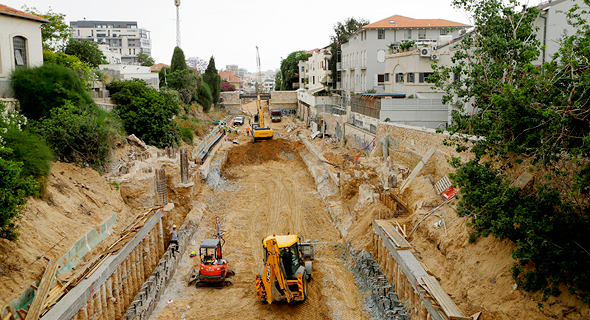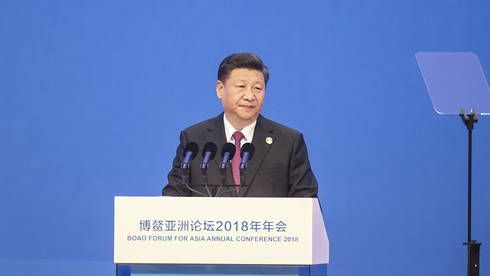U.S. officials pressure Israel on Chinese involvement in light-rail project
Chinese company involved with the project was recently put under a U.S. investment injunction. Israeli Treasury: Discussions on the matter are confidential
15:1220.06.21
Senior U.S. administration officials are putting heavy pressure on Israeli Ministry of Finance officials regarding Chinese infrastructure companies participating in a tender for the light rail lines planned in, and around, Tel Aviv. The U.S. is referring to Chinese government companies participating in the tender for the project’s purple line and red line.
 Tel Aviv light rail construction Photo: Amit Shaal
Tel Aviv light rail construction Photo: Amit Shaal
 Chinese President Xi Jinping Photo: Bloomberg
Chinese President Xi Jinping Photo: Bloomberg
 Tel Aviv light rail construction Photo: Amit Shaal
Tel Aviv light rail construction Photo: Amit Shaal The company in focus is China Railway Construction Corporation or CRCC, which U.S. President Joe Biden recently issued an executive order banning them from receiving U.S. investment. The U.S. administration says that CRCC and the companies listed in the injunction "directly threaten U.S. security."
CRCC is bidding in the tender as part of a group that includes Chinese company CRRC, Israel’s Shikun & Binui, and Israeli public transport provider Egged. However, it is likely that the U.S. administration is also dissatisfied with the candidacies of the other Chinese companies because they are all considered governmental and are subject, in one way or another, to the Chinese state and the Communist Party. As part of China’s "Belt and Road" initiative, the Chinese government is investing in a network of land and marine infrastructure that will connect China with Europe, the Middle East, Africa, and other parts of the world.
It is unclear how the American opposition will affect the tender. The announcement of the winners of the purple and green line tender was due to already take place but was recently postponed following the refusal of former Transportation Minister Miri Regev to vacate the Kfar Shalem neighborhood located along the railway route. On the other hand, there are claims that the American pressure is amplified by commercial, security, and political interests.
The issue of Chinese investments in Israeli infrastructure makes headlines from time to time and has been addressed by Israeli security officials. In a private lecture recently, Israel's internal security service, Shin Bet, chief Nadav Argaman said "the Chinese influence in Israel is dangerous, especially with regard to strategic infrastructure and investments in large companies. Legislation is needed to oversee Chinese investment. That could be very dangerous."
The issue also made headlines in the context of Shanghai International Port Group (SIPG) winning a tender to operate the port in Haifa, and in addition to a Chinese company, Pan Mediterranean, building the infrastructure in Ashdod’s port. Other Chinese companies have won other infrastructure projects in Israel, including electricity and desalination projects.
The government body that deals with such issues is the "Advisory Committee for the Examination of National Security Aspects in Foreign Investment", established by the government in late 2019. The committee, headed by the chief economist at the Ministry of Finance, also includes senior representatives from the Ministry of Defense and the National Security Council. Calcalist learned that the committee's activities and decisions are confidential, but it is active and convenes regularly. Furthermore, it can be assumed that the matter of Chinese companies in the context of the light rail was examined by the committee.
Israel’s State Comptroller's report from August 2020, which was entitled "Involvement of Foreign Companies in the Establishment and Operation of Essential National Infrastructure Projects," addressed the problematic situation in which security considerations arrive at the government's doorway towards the end of a tender’s process. The State Comptroller’s report recommends that the Advisory Committee formally consider and establish a clear procedure to prevent a situation where the state reaches agreements that are later reconsidered. Needless to say, this is exactly the case with the tender for the Purple and Green line, which is in its final stages and there is now growing pressure to intervene in the process on grounds of national security and foreign relations.
In the past, Israel’s Builders Association petitioned against Chinese companies in the Israeli High Court and asked that they would have restrictions on pricing and participation in tenders. Israel’s Builders Association claims that these Chinese corporations are in fact part of one joint group headed by the Chinese government. The petition was denied due to the opinion that the involvement of the Chinese companies benefits local competition.
 Chinese President Xi Jinping Photo: Bloomberg
Chinese President Xi Jinping Photo: Bloomberg Five groups are competing in the Green and Purple Line tenders, three of which include Chinese companies. The list of groups competing for the construction of the two new lines in the tenders includes Spanish CAF in collaboration with Shapir Engineering; Chinese CRRC and CRCC with Shikun & Binui and Egged; Alstom in collaboration with Electra and Dan; Chinese CREC in collaboration with the Canadian company Bombardier, Excellence, Noy Fund and Phoenix, and the fifth group, which includes China Harbor, in collaboration with Minrav, Allied and Clal.
The winners of the tender are responsible, among other things, for the construction and maintenance of the electrical systems, signaling, and the supply of the carriages on the two new lines, which according to estimates in the transportation industry are scheduled for launch by the end of 2027. The cost of the two lines is estimated at NIS 30 billion (more than $9 billion).
The Ministry of Finance stated: "The Committee for the Examination of Foreign Investments convenes on an ongoing basis and acts under the provisions of the Cabinet. The committee's deliberations are therefore confidential and it is not possible to address issues that were raised or not."



